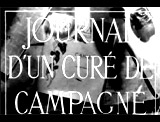
|
Diary of a Country Priest (1951,
Fr.) (aka Journal D'un Curé de Campagne)
In director Robert Bresson's first substantial film
(although his fourth), it was based upon Georges Bernanos' 1936 novel
of the same title - the challenging story was a depressing and sad
tale of alienation and the struggle to keep one's
faith in a world of pain and
suffering:
- the film's opening showed
a serious-minded, solemn-looking country Priest, writing in his
personal journal-diary, beginning with his spoken voice-over: "I
don't think I'm doing anything wrong in writing down daily, with
absolute frankness, the simplest and most insignificant secrets
of a life actually lacking any trace of mystery"
- the main character was a naive,
idealistic, physically-weak, young priest - the Curé d'Ambricourt
(Claude Laydu), who was assigned to work in
the rural village of Ambricourt - it would be his first parish; he
arrived on his bicycle, and admitted he was sickly and in poor health,
and subsisting on an ascetic diet of stale
dried bread dipped in cheap, sweetened wine; it would be a sacrificial
and solitary life
- one of the priest's ascerbic, poor and elderly
parishioners named Mr. Fabregars (Léon Arvel) cruelly complained
about the unfair, exploitative costs of his wife's upcoming funeral;
the Priest gradually began to receive a general lack of acceptance
of his suffering, Christ-like life by the hostile and apathetic
villagers
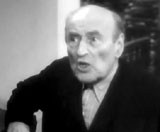
Parishioner Mr. Fabregars (Léon Arvel)
|

Curé de Torcy (Andre Guibert)
|
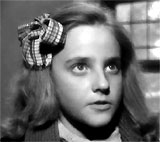
Séraphita Dumontel (Martine Lemaire)
|
- when the Priest asked his
superior the Curé de Torcy
(Andre Guibert) for support and advice, he was told to
not desire to be accepted in the community ("Besides exterminating
the Devil, your other dream is to be loved for who you are. A true
priest is never loved. The church doesn't care a whit whether you're
loved, my son. Be respected, obeyed. Keep order all day long, knowing
full well disorder will win out tomorrow, because in this
sorry world, the night undoes the work of the day"); during a
second visit with Torcy, the Superior was demeaning: "The bishop must
be hard up for priests to put a parish in your hands...You're too fussy.
Just like a hornet in a bottle...Besides, you have no common sense...Face-to-face
with your new parish, you cut an odd figure...Well, carry on. What
else can I say?"
- while teaching catechism class for young girls to
prepare them for Holy Communion (Eucharist), his brightest and
most beguiling student Séraphita Dumontel (Martine
Lemaire) gave the best answers and received good marks; but he realized that
she had plotted with her prankster-schoolmates to torment him
by offering him insincere compliments ("You have such beautiful
eyes"), to actually mock him and cause her friends to laugh outside
the classroom door; on another occasion when he retrieved Seraphita's
deliberately tossed school-book bag into the mud, he returned
it to her home and her mother revealed her ungratefulness ("I was
received very roughly")

|
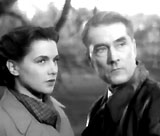
|
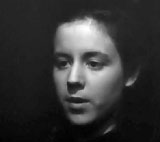
The Sad and Withdrawn Chantal, The Count's Teen
Daughter During a Confessional
|
|
First Hint of an Affair by the Unfaithful
Count (Jean Riveyre) with His Daughter's Governess
|
- in town was the lavish gated
chateau-manor of the town's wealthiest and most influential citizen
known as the Count/Le Comte (Jean Riveyre); Count
Ferrant's bereft and troubled Countess wife (Rachel Bérendt) remained
grief-stricken at the death of her young son
- the Priest was shocked when he received an unsigned
letter urging him to seek a transfer to another parish as soon
as possible, with words of warning: "Get out!"; the Priest was
continually challenged to keep his faith: ("Behind me there was
nothing, and before me was a wall. A black wall"), and he doubted
his strength to keep his reasoning and nerves intact, and expressed
self-hate ("I was nothing but a miserable, unworthy priest")
- during a confessional, it was revealed to the Priest
by the Count's sad,
manipulative, possibly-suicidal teen daughter Chantal (Nicole Ladmiral)
that her adulterous father was having an affair with the Governess; the
manipulative Chantal were bitterly angry and hateful at both her
father and mother - for her father's affair ("I no longer respect
him"), and for her unhappy mother's tacit condoning of the relationship
("She's a fool and a coward")
- the Priest felt compelled to counsel the embittered
Countess who blamed and hated God for the loss of her boy, and
for letting her husband's adultery continue; he taunted her: "God
will break you," but she responded: "He has broken me already...God
took my son from me. What more can He do to me? I no longer fear
Him"; he urged: "You must resign yourself. Open your heart...You
must yield to Him unconditionally" - but she reproached the Priest:
"What will you gain by making me admit I hate Him, you fool?"
- however, after a lengthy and serious conversation
with the Countess, the Priest helped her to accept her
situation, and aided her in restoring her spiritual communion with
God - it was his one success in town; the
Priest brought the Countess toward absolution and spirituality,
and the Countess admitted via a letter to him he received the next
day that she had attained peace: "I'm not resigned,
I'm happy. I desire nothing"
- shortly later, he learned that the Countess was
found deceased; he raced to the manor to offer his final blessing to her; a few days
later, Chantal confronted the Priest, and announced she had forced
the Governess to pack up and leave; the Count also criticized the
Priest for meddling: ("You have been unwillingly, or at least unknowingly,
the cause of a great misfortune... Your character and your habits
are a danger to the parish"); Chantal also charged the Priest
with harshly bullying and tormenting her mother to her death: ("She
claims her mother fought you to the last, and that you left her
upset and spiritually distraught"); apparently, Chantal had secretly
listened to their pivotal conversation and misinterpreted it; however,
the Priest confusedly refused to defend himself by showing the
Countess' letter to those questioning him. He even allowed Chantal
to call him a "drunkard" and promote her father's wish to
have him transferred away
- as the tormented Priest's health condition deteriorated
and he was vomiting blood (and at one point he fell face foward
into the mud and couldn't move), and he descended further into
his own spiritual doubts, he traveled by train to Lillie where
he was diagnosed with stomach cancer by Dr. Lavigne; he thought to
himself: "It took me a long time to realize I was to die from a
disease that rarely strikes people of my age"
- in the film's conclusion, the Priest's expected
death in the dingy apartment of Priest Dufrety (Bernard Hubrenne),
an ex-seminary colleague and friend (now living a secular and impoverished
life), was described in a typed letter (read in voice-over) sent
by Dufrety to Torcy. The Priest had succumbed alone in "great
anguish"
(spitting up blood and sweating profusely), while calmly accepting his
fate and absolution ("His face grew calm. He even smiled")
- with his last words: "What does it matter? All is grace." The
letter ended: "I believe he died just then."
|
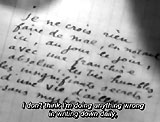
Journal Writing
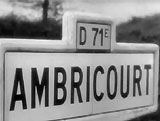
Village Sign
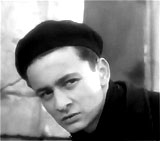
Arrival of Country Priest (Claude Laydu) by Bicycle at His First Parish in
Rural French Village

Teaching Catechism Class in Preparation for Eucharist
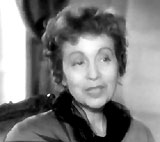
The Withdrawn and Grieving Countess
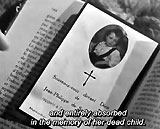
The Countess' Loss of an Young Son
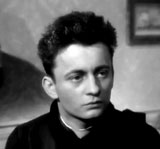

The Young Priest Counseling the Countess Regarding Her Unfaithful Husband
the Count

The Priest After Learning the Countess Had Died - Giving His Blessing
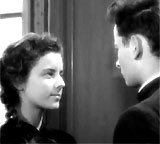
The Priest Meeting with Chantal After Her Mother's Death

The Priest - Feeling Deathly Sick After a Diagnosis of Stomach Cancer
|












